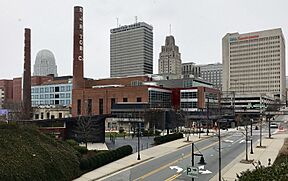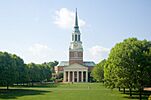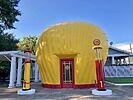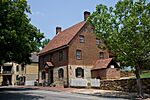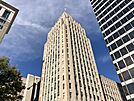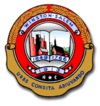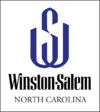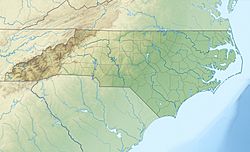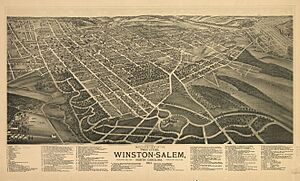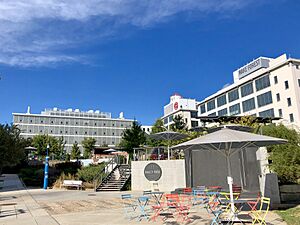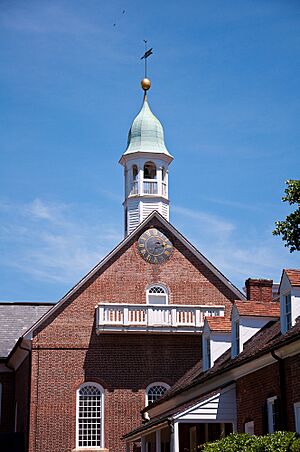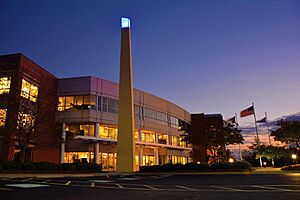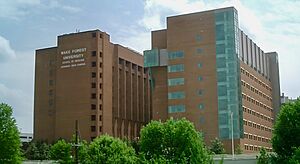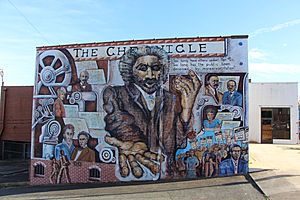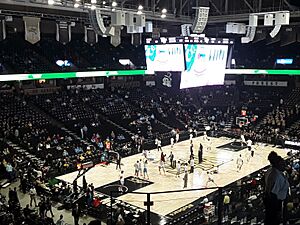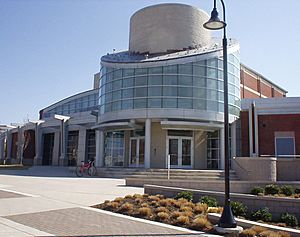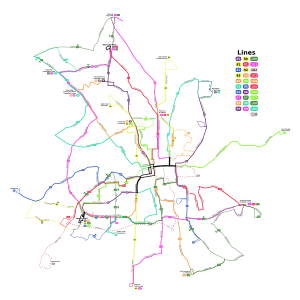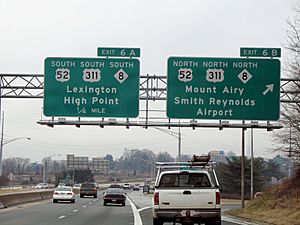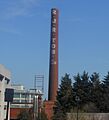Winston-Salem, North Carolina facts for kids
Quick facts for kids
Winston-Salem
|
|||||
|---|---|---|---|---|---|
|
|
|||||
|
|||||
| Nickname(s):
The Twin City, Winston, W-S,
The Dash City, The 336, Camel City |
|||||
| Motto(s): | |||||
| Country | United States | ||||
| State | North Carolina | ||||
| County | Forsyth | ||||
| Founded | 1766 (Salem), 1849 (Winston) |
||||
| Consolidated | 1913 (Winston-Salem) | ||||
| Named for | Joseph Winston and "Shalom" (Hebrew meaning "Peace") | ||||
| Area | |||||
| • Total | 134.74 sq mi (348.98 km2) | ||||
| • Land | 133.53 sq mi (345.84 km2) | ||||
| • Water | 1.21 sq mi (3.14 km2) 0.90% | ||||
| Elevation | 791 ft (241 m) | ||||
| Population
(2020)
|
|||||
| • Total | 249,545 | ||||
| • Estimate
(2023)
|
252,975 | ||||
| • Rank | 5th in North Carolina 91st in United States |
||||
| • Density | 1,868.82/sq mi (721.55/km2) | ||||
| • Urban | 420,924 (US: 98th) | ||||
| • Urban density | 1,354.4/sq mi (522.9/km2) | ||||
| • Metro | 695,630 (US: 86th) | ||||
| Demonym(s) | Winston-Salemite, Winstonian | ||||
| GDP | |||||
| • Metro | .939 billion (2022) | ||||
| Time zone | UTC−5 (Eastern) | ||||
| • Summer (DST) | UTC−4 (EDT) | ||||
| ZIP codes |
27023, 27040, 27045, 27101-27110, 27113-27117, 27120, 27127, 27130, 27150, 27152, 27155, 27157, 27198-27199, 27284
|
||||
| Area codes | 336, 743 | ||||
| FIPS code | 37-75000 | ||||
| GNIS ID | 2405771 | ||||
Winston-Salem is a city in Forsyth County, North Carolina, United States. In 2020, about 249,545 people lived there. This makes it the fifth largest city in North Carolina. It is also the 91st largest city in the United States. The area around Winston-Salem, called the metropolitan area, had about 695,630 people in 2023.
Winston-Salem is often called the "Twin City" because it was formed by joining two older towns. It's also known as the "Camel City." This name comes from the city's history with the tobacco industry. The famous Camel cigarettes were made by the R. J. Reynolds Tobacco Company, which started here. Many people in North Carolina just call the city "Winston."
The city is home to several colleges and universities. These include Wake Forest University, Winston-Salem State University, and the University of North Carolina School of the Arts.
Contents
History of Winston-Salem
The city of Winston-Salem was created in 1913. It was formed when two nearby towns, Winston and Salem, decided to join together.
The Town of Salem
The town of Salem began in January 1753. A group called the Moravian Church chose this spot for a new settlement. They named the area "Wachovia." This name came from the home of Count Nicolaus Ludwig von Zinzendorf, who helped the Moravians.
The Moravians bought a large piece of land, almost 99,000 acres. The first settlers arrived in November 1753 at a place called Bethabara. This was not meant to be the main town. Some people moved to a nearby settlement called Bethania in 1759.
Later, they chose a new spot for their main town. They named it Salem, which means "Peace" in Hebrew. On January 6, 1766, they started building Salem. Salem was a typical Moravian town. Its main buildings, like the church and homes for unmarried members, were around a central square. For many years, only Moravian Church members could live there. This rule ended before the American Civil War.
Many of the old buildings in Salem have been fixed up. They are now part of Old Salem Museums & Gardens. Salem became an official town in December 1856. Every Easter morning, thousands of people gather at Salem Square for a famous Moravian sunrise service.
The Town of Winston
In 1849, the Salem community sold land north of Salem. This land was for the new county seat of Forsyth County. The new town was first called "the county town." In 1851, it was named Winston, after a local hero from the Revolutionary War, Joseph Winston.
For its first 20 years, Winston was a quiet town. In 1868, business leaders worked to connect Winston to the North Carolina Railroad. That same year, Thomas Jethro Brown opened the first tobacco warehouse in Winston. Pleasant Henderson Hanes built his first tobacco factory nearby. In 1875, Richard Joshua Reynolds built his first tobacco factory close to Hanes's factory.
By the 1880s, Winston had almost 40 tobacco factories. Hanes and Reynolds were big rivals. They bought many smaller factories. In 1900, Hanes sold his business to Reynolds and started a new career in textiles.
Winston-Salem: The Twin City
In the 1880s, the U.S. Post Office started calling the two towns "Winston-Salem." In 1899, the Winston-Salem post office was officially set up in Winston. The Salem office became a branch. After a vote, the towns officially joined together as "Winston-Salem" in 1913.
The R. J. Reynolds Tobacco Company played a huge part in the city's history. By the 1940s, 60% of workers in Winston-Salem worked for Reynolds or the Hanes textile factories. Reynolds imported so much French cigarette paper and Turkish tobacco for Camel cigarettes. Because of this, Winston-Salem became an official port of entry for the United States. This was special because the city is 200 miles inland from the coast. By 1916, it was the eighth-largest port of entry in the U.S.
In 1917, the company bought 84 acres in Winston-Salem. They built 180 houses and sold them cheaply to workers. This area was called "Reynoldstown." When R.J. Reynolds died in 1918, his company owned 121 buildings in the city.
In 1920, Winston-Salem had a population of 48,395. It was the largest city in North Carolina. It was also the largest city between Atlanta and Washington, D.C.
The Reynolds Building was finished in Winston-Salem in 1929. This 21-story skyscraper was the headquarters of R.J. Reynolds Tobacco Company. It was the tallest building south of Baltimore, Maryland, at the time. It was even named the best building of the year by the American Institute of Architects. The Reynolds Building is famous for being the design model for the much larger Empire State Building in New York City. Every year, the Empire State Building staff sends a Father's Day card to the Reynolds Building staff.
Early Businesses and Innovations
Winston-Salem has been home to many important businesses:
- In 1799, the Winkler Bakery started making famous Moravian cookies. It still operates today as part of Old Salem.
- In 1875, R. J. Reynolds founded the R. J. Reynolds Tobacco Company. They made famous brands like Prince Albert tobacco and Camel cigarettes.
- In 1901, J. Wesley Hanes's Shamrock Hosiery Mills began making men's socks. His brother, Pleasant Henderson Hanes, started making men's underwear. These companies later became Hanesbrands, a big name in textiles.
- In 1911, Wachovia Bank and Trust was formed. It grew into a major bank before being bought by Wells Fargo in 2009.
- In 1929, T.W. Garner Foods introduced Texas Pete, a popular hot sauce.
- In 1937, Krispy Kreme opened its first doughnut shop on South Main Street.
- In 1948, Piedmont Airlines was created. It became a top airline before being bought by USAir in 1987.
Geography and Neighborhoods
Winston-Salem is in the northwest Piedmont area of North Carolina. It is about 65 miles northwest of the state's center. The city covers about 134.74 square miles of land and water. Most of its water drains into the Yadkin–Pee Dee River Basin.
North of Winston-Salem are the ancient Sauratown Mountains. These mountains are named after the Saura people who once lived in this area. Winston-Salem is 16 miles northwest of High Point and 25 miles west of Greensboro.
Exploring Winston-Salem's Areas
Winston-Salem has 66 neighborhoods and covers 135 square miles. It is the 72nd largest city by area in the United States. It is also the fifth largest city in North Carolina by population.
Downtown Winston-Salem
Downtown is the main business area of Winston-Salem. It is the largest downtown in the Piedmont Triad region. About 14,000 people live downtown, and over 27,000 people work there. Fourth Street is a popular area with restaurants, shops, hotels, and apartments. Downtown has attractions like Innovation Quarter, Truist Stadium, and Old Salem.
West End Neighborhood
West End is a well-known neighborhood. It has a historic district with many buildings built between 1887 and 1930. West End offers an urban lifestyle with shops, parks, and restaurants.
Ardmore Neighborhood
Ardmore is the largest neighborhood in Winston-Salem. It is home to the Ardmore Historic District, which has over 2,000 buildings. Ardmore is close to Wake Forest Baptist Medical Center. This hospital is the largest employer in Forsyth County, with over 13,000 employees.
Buena Vista Neighborhood
Buena Vista is northwest of downtown. It is known for its quiet, tree-lined streets and expensive homes. It is close to the Reynolda House and Reynolda Gardens. It is also near Thruway, an upscale shopping center.
Hanes Mall Boulevard and Stratford Road
This area, seven miles southwest of downtown, is the busiest shopping district. It has many large stores like Target and Costco. Two major companies, Novant Health and Truliant Federal Credit Union, are located here.
University Area
The university area is in the north-central part of the city. It has busy roads like University Parkway, named after Wake Forest University. Attractions include the Winston-Salem Entertainment-Sports Complex, which has the LJVM Coliseum and the Winston-Salem Fairgrounds. The fairgrounds host the Carolina Classic Fair every year.
Climate and Weather
Winston-Salem has a humid subtropical climate. This means it has cool winters and warm, humid summers. Temperatures usually stay between 32°F (0°C) and 87°F (31°C). It rarely gets colder than 19°F (-7°C) or hotter than 94°F (34°C).
| Climate data for Winston-Salem, North Carolina (Smith Reynolds Airport), 1991–2020 normals, extremes 1899–present | |||||||||||||
|---|---|---|---|---|---|---|---|---|---|---|---|---|---|
| Month | Jan | Feb | Mar | Apr | May | Jun | Jul | Aug | Sep | Oct | Nov | Dec | Year |
| Record high °F (°C) | 79 (26) |
83 (28) |
91 (33) |
93 (34) |
101 (38) |
104 (40) |
104 (40) |
104 (40) |
102 (39) |
96 (36) |
84 (29) |
79 (26) |
104 (40) |
| Mean daily maximum °F (°C) | 48.8 (9.3) |
52.8 (11.6) |
60.8 (16.0) |
70.6 (21.4) |
77.9 (25.5) |
84.9 (29.4) |
88.0 (31.1) |
86.1 (30.1) |
80.1 (26.7) |
70.6 (21.4) |
60.1 (15.6) |
51.7 (10.9) |
69.4 (20.8) |
| Daily mean °F (°C) | 39.8 (4.3) |
43.0 (6.1) |
50.4 (10.2) |
59.4 (15.2) |
67.5 (19.7) |
75.1 (23.9) |
78.6 (25.9) |
77.0 (25.0) |
70.6 (21.4) |
59.9 (15.5) |
49.6 (9.8) |
42.6 (5.9) |
59.5 (15.3) |
| Mean daily minimum °F (°C) | 30.7 (−0.7) |
33.2 (0.7) |
40.1 (4.5) |
48.3 (9.1) |
57.0 (13.9) |
65.4 (18.6) |
69.2 (20.7) |
67.9 (19.9) |
61.2 (16.2) |
49.3 (9.6) |
39.1 (3.9) |
33.6 (0.9) |
49.6 (9.8) |
| Record low °F (°C) | −10 (−23) |
−1 (−18) |
10 (−12) |
21 (−6) |
30 (−1) |
40 (4) |
48 (9) |
47 (8) |
36 (2) |
21 (−6) |
7 (−14) |
−3 (−19) |
−10 (−23) |
| Average precipitation inches (mm) | 3.35 (85) |
3.89 (99) |
3.60 (91) |
3.71 (94) |
3.76 (96) |
3.64 (92) |
4.24 (108) |
4.51 (115) |
3.86 (98) |
3.28 (83) |
3.06 (78) |
3.30 (84) |
43.20 (1,097) |
| Average precipitation days (≥ 0.01 in) | 9.5 | 9.4 | 11.2 | 10.2 | 12.2 | 11.8 | 11.9 | 11.1 | 10.0 | 9.2 | 8.5 | 9.2 | 125.5 |
| Source: NOAA | |||||||||||||
Population and People
| Historical population | |||
|---|---|---|---|
| Census | Pop. | %± | |
| 1870 | 443 | — | |
| 1880 | 4,194 | 846.7% | |
| 1890 | 10,729 | 155.8% | |
| 1900 | 13,650 | 27.2% | |
| 1910 | 22,700 | 66.3% | |
| 1920 | 48,395 | 113.2% | |
| 1930 | 75,274 | 55.5% | |
| 1940 | 79,815 | 6.0% | |
| 1950 | 87,881 | 10.1% | |
| 1960 | 111,135 | 26.5% | |
| 1970 | 133,683 | 20.3% | |
| 1980 | 131,885 | −1.3% | |
| 1990 | 143,485 | 8.8% | |
| 2000 | 185,776 | 29.5% | |
| 2010 | 229,617 | 23.6% | |
| 2020 | 249,545 | 8.7% | |
| 2023 (est.) | 252,975 | 10.2% | |
| U.S. Decennial Census 2020 |
|||
Winston-Salem's population grew by 8.7% from 2010 to 2020. This made it the fifth largest city in North Carolina.
Who Lives in Winston-Salem?
| Race / Ethnicity (NH = Non-Hispanic) | Pop 2000 | Pop 2010 | Pop 2020 | % 2000 | % 2010 | % 2020 |
|---|---|---|---|---|---|---|
| White alone (NH) | 97,420 | 108,222 | 109,714 | 52.44% | 47.13% | 43.97% |
| Black or African American alone (NH) | 67,648 | 78,065 | 79,788 | 36.41% | 34.00% | 31.97% |
| Native American or Alaska Native alone (NH) | 453 | 567 | 607 | 0.24% | 0.25% | 0.24% |
| Asian alone (NH) | 2,082 | 4,536 | 6,275 | 1.12% | 1.98% | 2.51% |
| Pacific Islander alone (NH) | 44 | 138 | 191 | 0.02% | 0.06% | 0.08% |
| Some Other Race alone (NH) | 267 | 535 | 1,140 | 0.14% | 0.23% | 0.46% |
| Mixed Race or Multi-Racial (NH) | 1,819 | 3,801 | 8,989 | 0.98% | 1.66% | 3.60% |
| Hispanic or Latino (any race) | 16,043 | 33,753 | 42,841 | 8.64% | 14.70% | 17.17% |
| Total | 185,776 | 229,617 | 249,545 | 100.00% | 100.00% | 100.00% |
In 2017, about 244,605 people lived in Winston-Salem. The average age was 35 years old. About 23.9% of the people were under 18. Also, 13.7% were 65 or older.
The city is very diverse. In 2017, 56.1% of the people were White, and 34.7% were Black or African American. About 14.8% of the population was Hispanic or Latino.
Religion in Winston-Salem
Winston-Salem is known as a religious city in North Carolina. About 54% of the people are part of a religious group. Christianity is the largest religion. Many people are Baptists (15.77%), Methodists (12.79%), or Catholics (4.39%). Other Christian groups include Pentecostals, Episcopalians, Presbyterians, and Lutherans. The Moravian Church also has a strong presence.
The city's history with the Moravian church is still important today. The Moravian star is used as the city's official Christmas decoration. A huge 31-foot Moravian star sits on top of the North Tower of Wake Forest Baptist Medical Center during the Christmas season. Another star is under Wake Forest University's Wait Chapel.
Economy and Jobs
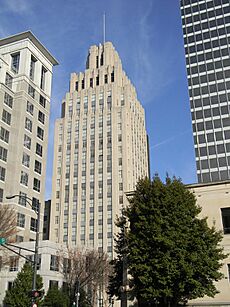
Winston-Salem is home to the main offices of several companies. These include HanesBrands, Lowes Foods Stores, Quality Oil Company, and Reynolds American (which owns R. J. Reynolds Tobacco Company). Blue Rhino, a large propane exchange company, is also based here. TW Garner Food Company, makers of Texas Pete hot sauce, is another local business.
The city used to be known for textiles and tobacco. Now, Winston-Salem is growing in new areas like nanotechnology, high-tech, and biotech. Medical research is a fast-growing industry. Wake Forest Baptist Medical Center is the largest employer in the city.
The Wake Forest Innovation Quarter is a big project in downtown Winston-Salem. It has received $713 million in investments. This area is a hub for business, education, and research in fields like biomedical science and digital media. It also has apartments, restaurants, and public spaces. The Innovation Quarter is home to 90 companies, over 3,600 workers, and 1,800 students. It is a leading innovation district in the world.
Top Employers in the City
Here are the ten largest employers in Winston-Salem, based on data from 2012–2013:
| # | Employer | # of Employees |
|---|---|---|
| 1 | Wake Forest Baptist Medical Center | 11,750 |
| 2 | Novant Health | 8,145 |
| 3 | Winston-Salem/Forsyth County Schools | 6,692 |
| 4 | City/County Government | 4,689 |
| 5 | Reynolds American, Inc. | 3,000 |
| 6 | Wells Fargo | 2,800 |
| 7 | Hanesbrands Inc. | 2,251 |
| 8 | Truist Financial | 2,200 |
| 9 | Wake Forest University | 1,680 |
| 10 | Lowe's Foods | 1,500 |
Main Industries in Winston-Salem
Here are the major industries in Winston-Salem/Forsyth County by percentage of jobs:
| # | Employment by Sector | % Percentage |
|---|---|---|
| 1 | Health Care and Social Assistance | 29% |
| 2 | Trade, Transportation and Utilities | 19% |
| 3 | Professional and Business Services | 14% |
| 4 | Manufacturing | 10% |
| 5 | Leisure and Hospitality | 10% |
| 5 | Financial Activities | 6% |
| 7 | Public Administration | 4% |
| 8 | Construction | 3% |
| 9 | Other Services | 3% |
| 10 | Information | 1% |
Shopping Areas
Winston-Salem has many places to shop. Hanes Mall is one of the largest shopping malls in North Carolina. The area around the mall is a big shopping district. Other notable shopping centers include Thruway Center, Hanes Point Shopping Center, and Reynolda Village.
Arts and Culture
Historic Places to Visit
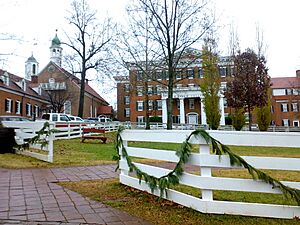
Old Salem is a restored Moravian settlement from 1766. Most of its buildings are original. It is a living history museum where you can see tinsmiths, blacksmiths, and bakers working. Old Salem also has the Museum of Early Southern Decorative Arts (MESDA). This museum shows furniture, ceramics, and textiles from the 1700s and 1800s.
The Bethabara Historic District is where the first Moravians settled in North Carolina. This 195-acre area has a museum and a Moravian church. You can also enjoy hiking and birdwatching there.
Museums to Explore
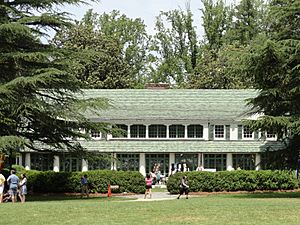
The Reynolda House Museum of American Art has art from the colonial period to today. The house was built in 1917 by Katherine Smith Reynolds and her husband R.J. Reynolds. It became an art museum in 1967. Behind the house is Lake Katherine, which is now wetlands with wildlife.
The Southeastern Center for Contemporary Art (SECCA) is a modern art gallery. It was founded in 1956. SECCA shows art by regional, national, and international artists. It has three exhibit halls and an auditorium.
Kaleideum is an interactive children's museum. It helps kids from birth to eight years old think creatively and learn. Kaleideum has two locations. Kaleideum Downtown has exhibits like a recreated Krispy Kreme doughnut assembly line. Kaleideum North has a planetarium and live animals.
The New Winston Museum tells the history of Winston-Salem and Forsyth County since 1850. The Wake Forest University Museum of Anthropology has many artifacts and historical items.
Arts and Music Scene
Winston-Salem created the first arts council in the United States in 1949. This is because of the city's many art schools and attractions. These include the University of North Carolina School of the Arts, the Winston-Salem Symphony, and the Stevens Center for the Performing Arts.
The city's Arts District is around Sixth and Trade Streets. Here you can find many art galleries, restaurants, and workshops. The ARTivity on the Green art park is also nearby. Winston-Salem is also home to the Art-o-mat, which sells small pieces of art from old cigarette machines.
The city hosts the National Black Theatre Festival and the RiverRun International Film Festival.
Many famous musicians have recorded music in Winston-Salem. R.E.M. recorded their first EP, Chronic Town, here in 1981. The city also hosts the Heavy Rebel Weekender music festival each year.
Movies Filmed in Winston-Salem
Many movies have been filmed in Winston-Salem, including:
- The Bedroom Window (1987)
- Mr. Destiny (1990)
- Eddie (1996)
- George Washington (2000)
- Junebug (2005)
- Leatherheads (2008)
- The Longest Ride (2014)
Parks and Outdoor Fun
Reynolda Gardens is a 4-acre formal garden. It was once part of the R. J. Reynolds country estate.
Tanglewood Park is a large recreation center. It has a pool, lazy river, tennis courts, and golf. Every year, Tanglewood Park hosts the Festival of Lights, a drive-through light show for the holidays.
The Winston-Salem Fairgrounds Annex hosts the Carolina Classic Fair every autumn. The fair is very popular, with over 371,000 visitors in 2007.
Salem Lake is in southeastern Winston-Salem. It has a seven-mile dirt trail for hiking, walking, fishing, and biking. It is often called the "hidden diamond in the city."
Sports Teams and Venues
Winston-Salem has many sports teams and venues:
| Team | Sport | League | Venue |
|---|---|---|---|
| Winston-Salem State University Rams | Basketball | NCAA | C. E. Gaines Center |
| Winston-Salem State University Rams | American Football | NCAA | Bowman Gray Stadium |
| Winston-Salem State University Rams | Softball | NCAA | Washington Park |
| Winston-Salem State University Rams | Tennis | NCAA | WSSU Tennis Center |
| Winston-Salem State University Rams | Track & Field | NCAA | Civitan Park |
| Winston-Salem Dash | Baseball | SAL | Truist Stadium |
| Carolina Thunderbirds | Ice Hockey | FPHL | Winston-Salem Fairgrounds Arena |
| Winston-Salem Wolves | Basketball | East Coast Basketball League | Childress Center |
| Wake Forest football | American football | NCAA | Truist Field at Wake Forest |
| Wake Forest basketball | Basketball | NCAA | LJVM Coliseum |
The Winston-Salem Dash are a minor-league baseball team. They play at the new Truist Stadium. Many famous baseball players have played for this team.
The Carolina Thunderbirds are a minor-league hockey team. They started playing in 2017 at the Winston-Salem Fairgrounds Arena.
Wake Forest University is part of the Atlantic Coast Conference (ACC). Their football team plays at Truist Field at Wake Forest. Their soccer team won the NCAA championship in 2007.
NASCAR racing takes place at Bowman Gray Stadium from March to August. It is NASCAR's longest-running racing series. The stadium is also used for Winston-Salem State Rams football games.
Winston-Salem hosts an ATP tennis tournament every year. The matches are played at the Wake Forest tennis center.
Education and Learning
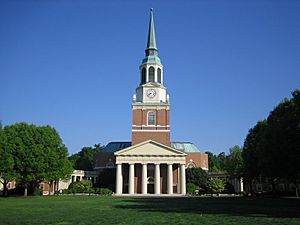
Schools for Kids and Teens
Winston-Salem/Forsyth County Schools manages most of the schools in the city. There are 51 elementary schools, 25 middle schools, and 13 high schools. West Forsyth High School is the largest, with over 2,400 students. This school district is the most diverse in North Carolina. It is the fourth-largest school system in North Carolina, with about 59,000 students.
There are also many private and religious schools. These include St. Leo The Great, Our Lady of Mercy Catholic School, and Calvary Day School. Salem Academy, located in Old Salem, has been educating young women since 1772.
Colleges and Universities
Winston-Salem has several colleges and universities:
- Forsyth Technical Community College
- Winston-Salem State University, a historically Black university founded in 1892.
- University of North Carolina School of the Arts, the first public arts conservatory in the U.S.
- Wake Forest University, a private research university that moved to Winston-Salem in 1956.
- Carolina Christian College
- Carolina University
- Salem College, the oldest continuously operating college for women in America, founded in 1772.
Media and News
Newspapers in Winston-Salem
The Winston-Salem Journal is the main daily newspaper. Yes! Weekly is a free paper that covers news, arts, and entertainment. The Winston-Salem Chronicle is a weekly newspaper that focuses on the African American community.
Radio Stations
Here are some radio stations located in Winston-Salem:
- WFDD, 88.5 FM, Wake Forest University (NPR Affiliate)
- WBFJ, 89.3 FM, Your Family Station (Contemporary Christian music)
- WSNC, 90.5 FM, Winston-Salem State University (Jazz)
- WSJS, 600 AM, News-Talk Radio
- WTOB, 980 AM, Classic Hits
Television Stations
Winston-Salem is part of the Greensboro/Winston-Salem/High Point television area. Some local stations include:
- WFMY-TV, Channel 2, CBS, Greensboro
- WGHP, Channel 8, Fox, High Point
- WXII-TV, Channel 12, NBC, Winston-Salem
- WXLV-TV, Channel 45, ABC, Winston-Salem
Transportation and Travel
Public Transportation Options
The Winston-Salem Transit Authority (WSTA) provides public bus transportation. It took over from the Safe Bus Company in 1972. WSTA runs 30 bus routes during the day and 24 at night. They also have Saturday and Sunday routes. WSTA provides almost 3 million rides each year.
The Piedmont Authority for Regional Transportation (PART) connects Winston-Salem to other cities like Boone, High Point, and Greensboro. PART also has a bus route that goes to the Amtrak train station in High Point.
Major Roads and Highways
I-40 is the main interstate highway that goes through the city. US 52 is the main north-south highway. Salem Parkway (US 421) is an east-west highway that goes through downtown.
The Winston-Salem Northern Beltway is a new highway being built. It will go around the north side of the city.
Airports and Flying
Winston-Salem is served by Piedmont Triad International Airport in Greensboro. This airport serves the whole Piedmont Triad area.
A smaller airport, Smith Reynolds Airport, is located inside Winston-Salem. It is mainly used for private and charter flights. Every year, Smith Reynolds Airport hosts an air show. It is also home to the Winston-Salem Civil Air Patrol Composite Squadron.
Train Travel
Winston-Salem is one of the larger cities in the South without direct Amtrak train service. However, a bus service connects Winston-Salem to the Amtrak station in nearby High Point. From High Point, you can take trains like the Crescent or Carolinian to other cities.
Sister Cities
Winston-Salem has several sister cities around the world:
 Buchanan, Liberia
Buchanan, Liberia Freeport, Bahamas
Freeport, Bahamas Kumasi, Ghana
Kumasi, Ghana Nassau, Bahamas
Nassau, Bahamas Ungheni, Moldova
Ungheni, Moldova Yangpu (Shanghai), China
Yangpu (Shanghai), China
Images for kids
See also
 In Spanish: Winston-Salem para niños
In Spanish: Winston-Salem para niños


